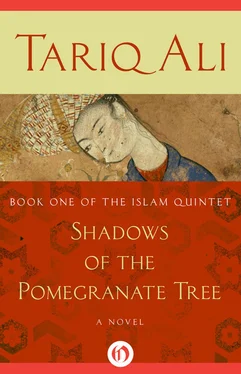‘If they wish to question anyone about Zuhayr they must deal with me,’ said Umar. ‘I will go and see them.’
‘No!’ barked another voice. ‘That you must not do under any circumstances. I was on my way to the house to talk to you.’
It was Ibn Hasd, the cobbler, who as Miguel’s natural brother was Umar’s uncle, but this was the first time he had ever spoken in the capacity of a family member. Umar raised his eyebrows as if to question the reasoning behind such a peremptory instruction.
‘Peace be upon you, Umar bin Abdallah. But the blacksmith Ibn Haritha has just returned. They dragged him off this morning to attend to the horseshoes which needed repair. He did not hear anything specific, but the eyes of the young captain frightened him. He says that even the Christian soldiers fear him as though he were Satan himself.’
‘And,’ continued Juan, ‘that wretch Ubaydallah has taken fifteen villagers with him to their camp. One can only imagine the stories he will tell to save his own neck. You must return to the house, Master, and seal the gate, till this is over.’
‘I will stay in the village,’ replied Umar in a tone that brooked no dissent. ‘We shall wait for Ubaydallah to return and tell us what they demand. Then, if necessary, I shall go and talk to this captain myself.’
THE RED-HEADED BEARDLESS CAPTAIN had not dismounted. Why is he still on his horse? This question was nagging Ubaydallah. His work over the last fifty years, as a manager of estates and human beings, had equipped him with an all too rare experience and knowledge which books alone can never provide. He had become an acute observer of human psychology. He had noticed that the captain had been cursed by his maker. His height, not an unimportant matter for a soldier, was not at all in keeping with his fierce disposition. He was stout and short. He could not be more than sixteen years of age. The facts, Ubaydallah was sure, could not be compensated for even by the officer’s military skills.
Once he had surmised this, Ubaydallah fell on his knees before the commander of the Christians. This act of self-abasement nauseated the villagers who had accompanied him. ‘Pig’s pizzle,’ one of them muttered under his breath. Ubaydallah was unworried by their reaction. He had made the captain feel tall. Nothing else mattered on that day. Years of service to the lords of the Banu Hudayl had prepared the steward well for the task he now sought to accomplish.
‘What is it you want?’ the captain asked him in a nasal voice.
‘My lord, we have come to inform you that the whole village is prepared to convert this very afternoon. All it requires is for Your Excellency to send us a priest and to honour the village by your presence.’
At first the request was greeted by silence. The captain gave no sign of life. He looked down through heavy-lidded, dark blue eyes at the creature kneeling before him. The captain had just turned sixteen, but he was already a veteran of the Reconquest. He had been commended for his courage during three battles in the al-Pujarras. His fearless savagery had brought him to the notice of his superiors.
‘Why?’ he snapped at Ubaydallah.
‘I do not understand, Excellency.’
‘Why have you decided to join the Holy Roman Church?’
‘It is the only true path to salvation,’ replied Ubaydallah, who was never renowned for discriminating between truth and falsehood.
‘You mean it is the only way to save your skins.’
‘No, no, Excellency,’ the old steward began to whine. ‘We Andalusians take a long time to decide anything. It is the result of being governed for hundreds of years by rulers who determined everything. On everything that mattered, they made our decisions for us. Now we are slowly beginning to make up our own minds, but it is not easy to discard an old habit. We are deciding for ourselves, but we take our time and we split hairs…’
‘How many of you are there in the village?’
‘At the last count we were just over two thousand.’
‘Very well. I shall think of the most appropriate response to your proposal. You may return to your village and await our decision.’
Just as Ubaydallah was about to rise, the captain hurled another question at him and the steward went back on his knees.
‘Is it true that an old standard depicting a blue key on a silver ground above some gibberish in your language still hangs in the palace of Abenfarid?’
‘It does, Excellency. It was a gift from the King of Ishbiliya to one of the great ancestors of Ibn Farid. The inscription in Arabic reads: “There is no other Conqueror but God.”’
‘The key symbolized the opening of the West, did it not?’
‘Of that I am not sure, Your Excellency.’
‘Are you not? Well, I am,’ said the captain in his most aloof and arrogant tone, indicating that he did not wish this conversation to meander any longer. ‘The Archbishop wishes to inspect it with his own eyes. You may inform the family of Abenfarid that I will call on them to collect the banner. You may go now.’
After Ubaydallah and the others had left, the captain, still on his horse, rode over to the two officers who had been listening from a distance and instructed them to round up all the soldiers. He wished to address them before they went into the village. When the men had gathered, the captain began to address them. His tone was friendly but authoritative.
‘Our objective is simple. You will erase this village and everything that it contains. Those are my instructions. There are no more than six or perhaps seven hundred able-bodied men in the village. They are unlikely to put up even a token resistance. It is not a pleasant task, but soldiers are not trained to be kind and gentle. His Grace’s orders were very clear. Tomorrow morning he wishes to instruct the cartographers to obliterate al-Hudayl from the new maps which they are preparing. Is that clear?’
‘No!’ cried a voice from the middle of the throng.
‘Come forward, man.’
A tall, grey-bearded soldier in his early fifties, whose father had fought behind the banner of Ibn Farid, strode to the front and stood facing the captain.
‘What is it that you want?’
‘I am the grandson of a monk and the son of a soldier. Since when has it become a Christian practice in these lands to kill children and their mothers? I tell you here and now that this arm and this sword will not kill any child or woman. Do with me as you will!’
‘It is obvious, soldier, that you were not with us in the al-Pujarras.’
‘I was at Alhama Captain, and I saw too much. I will not go through that again.’
‘Then you would have seen their women pour pots of boiling oil on our men. You will carry out your orders or suffer the consequences.’
The soldier became obstinate.
‘You have said yourself, Captain, that you do not expect any resistance. Why ask us to kill innocent people? Why?’
‘Old fool!’ replied the captain, his eyes flashing with anger. ‘You are not long for this world. Why be generous with our lives?’
‘I do not comprehend you, Captain.’
‘If you kill their men, the women and children will become filled with a blind hate of everything Christian. To save their lives they will convert, but it will be a poison. Do you hear me? A poison, permanently embedded in our skins. A poison which will become increasingly difficult to remove. Now do you understand?’
The old soldier shook his head in disbelief, but it was clear that he would not obey. The captain curbed his natural instincts. He did not wish to demoralize his soldiers just before they went into battle. He decided not to punish the mutineer.
‘You are spared your duties. You will return to Gharnata and await our return.’
Читать дальше












